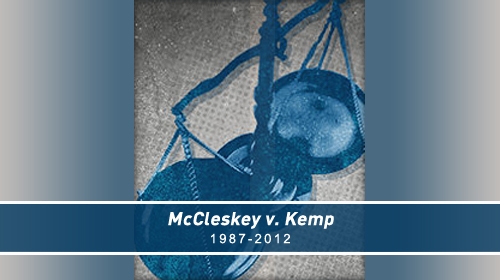
April 22 marks the 25th anniversary of the Supreme Court decision in McCleskey v. Kemp, in which the Court ruled that a defendant cannot rely upon statistical evidence of systemic racial bias to prove his death sentence unconstitutional, no matter how strong that evidence may be. McCleskey has been roundly condemned as a low point in the quest for equality that begs to be revisited. To mark the occasion, every day this week the ACLU Blog of Rights will feature a new post about McCleskey and its legacy. You can read all the posts here, and visit mccleskeyvkemp.com to learn more.
Justice Lewis Powell was right when he wrote for the majority in McCleskey v. Kemp that accepting the argument that race played a significant role in the administration of the death penalty would call into “serious question the principles that underlie our entire criminal justice system.” Unfortunately, it was a question the Court was afraid to have answered, and so they chose instead to reject the argument. Their decision seemed driven, in the famous words of Justice William Brennan’s dissent, by a “fear of too much justice.”
The impact of the ruling in McCleskey — that a prisoner on death row could not introduce statistical evidence of racial bias in the system to challenge his death sentence — has reached far beyond the realm of the death penalty. The decision, joined later by others like United States v. Armstrong, has made it nearly impossible to bring direct court challenges to racial disparities in the criminal justice system — of which there are many.
In the last 40 years, this country’s “tough on crime” policymaking and failed War on Drugs have sacrificed the lives and rights of people — predominantly people of color — at the altar of politics. Politicians have opted for senseless overcriminalization and overincarceration that have landed more people in the grips of the criminal justice system in the U.S. than in any other nation. As a result, huge segments of Black and brown communities have been locked into permanent second class status, yielding statistics that both shock and numb. A Black man born today has a one in three chance of being imprisoned during his lifetime. Although government studies consistently find that Blacks make up fewer than 15 percent of all drug users, they account for 37 percent of all drug arrests, and 50 percent of state drug felony prisoners. Even though public health surveys find that whites use marijuana at higher rates than Blacks or Latinos, the arrest rates for marijuana possession are disproportionately high for men and women of color. Black people accounted for 93 percent of marijuana possession arrests in Atlanta in 2011. More than 80 percent of marijuana arrests in New York City from 1997 to 2010 were of Blacks and Latinos. The list of horrifying and confounding statistics goes on and on and on.
Unfortunately, McCleskey has left racial justice advocates with few litigation avenues to challenge such gross racial disparities, even in the face of highly sophisticated statistical studies that establish that race bias infects the system. But McCleskey does not spell the end for fairness in the justice system. While the ruling closed the door on direct court challenges to racial disparities in the system, advocates are using other strategies to achieve racial justice. We have not thrown up our hands and declared defeat in the face of the persistent and needless mass incarceration of black and brown communities.
There is a movement afoot of advocates, family members of the incarcerated, the formerly incarcerated, lawyers, organizers, faith leaders, journalists and policymakers working tirelessly all over the country, most fueled by a sense of moral outrage, to expose the racial injustice that is our criminal justice system and to reverse the tide of mass incarceration. Our criminal justice system is so thoroughly contaminated with racial injustice and race disparities at every stage of the system that any rational reform effort will have an impact on communities of color. We are advocating for an end to the War on Drugs as we know it and for a reinvestment of corrections costs into schools, jobs, and access to healthcare and treatment. We are working in state legislatures and with state Departments of Corrections for alternatives to incarceration and more rational and proportional sentencing. We are pushing for laws that create opportunities to challenge racial discrimination in the administration of justice, such as the Racial Justice Act in North Carolina. We are fighting for the human dignity of those arrested and jailed in overcrowded, squalid conditions. We are demanding an end to policies that target and harass communities of color.
This movement is fighting vigorously, often against all odds, to dismantle the machine of mass incarceration in every community and every state. We are working hard to bring others into this movement. And we are reversing the tide, one reform at a time, one story at a time, one case at a time. The McCleskey Court may have been afraid of “too much justice,” but we are not.
Learn more about race and the death penalty: Sign up for breaking news alerts, follow us on Twitter, and like us on Facebook.


